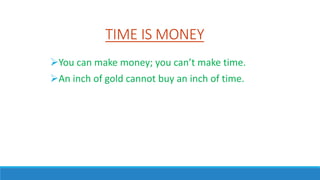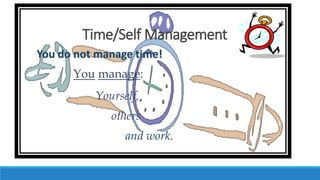Time management
- 3. Definition The predictable control an individual can exercise over a series of events.
- 4. Use your time wisely • Time is what we want most, but what we use worst. William Penn • The common man is not concerned about the passage of time, the man of talent is driven by it. Schopenhauer • The key is in not spending time, but in investing it. Stephen R. Covey • Make use of time, let not advantage slip. William Shakespeare
- 5. TIME IS MONEY You can make money; you can’t make time. An inch of gold cannot buy an inch of time.
- 6. WHY TIME MANAGEMENT ? To utilise the available time in optimum manner to achieve one’s personal and professional goals.
- 7. Why do we need TM ? To save time To reduce stress To function effectively To increase our work output
- 8. TIME FOR EVERYTHING Take time to work,it is the price of success Take time to think,it is the source of power Take time to play,it is the source of youth Take time to read,it is the source of wisdom Take time to love, it is the privilege of Gods Take time to serve,it is the purpose of life Take time to laugh,it is the music of soul
- 9. Time management in Islamic Perspective
- 10. Time management in Islamic Perspective
- 19. What does “Time” (SELF) Management do for you, your job, your group and/or your organization? Why Is It Necessary?
- 20. Controlling The Demands Manage the work (use time constructively). Improve productivity/effective-ness (spend time on results-producing activities). Let’s look at this thing called, “Time Management.”
- 21. Time Wasting Culprits (1 of 2) Telephone Interruptions Extended Lunches or Breaks Poorly Run Meetings Socializing On The Job Misfiled Information
- 22. Poor Planning Waiting/Delays Paperwork Junk Mail Drop-In Visitors Time Wasting Culprits (2 of 2)
- 23. HOW TO CONTROL INTERRUPTIONS •Set a time limit and stick to it. •Set the stage in advance : You are very busy with a deadline in light. •With casual droppers-in, remain standing. •Meet in other person’s office. •Get visitors to the point. •Be ruthless with time but gracious with people. •Have a clock available . •Use a call-back system for telephone calls.
- 24. Time/Self Management You do not manage time! You manage: Yourself, others and work.
- 25. How to Use Time Effectively • Effective Planning • Setting goals and objectives • Setting deadlines • Delegation of responsibilities • Prioritizing activities as per their importance • Spending the right time on the right activity
- 26. The process of TM starts with • Cost your time • Making activity logs • Goal setting • Planning • Prioritizing • Scheduling
- 27. Costing your time Understand your true value by calculating your cost per year Cost per year = (Salary + taxes + office space + office equipment + profit you generate) Calculate your hourly rate =Cost per year / work hr per year
- 28. Making activity logs Help in • Make a realistic estimate of the time spend during the day on job orders • Pinpoint the critical areas:-time spend on low value jobs • Finding the high yielding time of our day
- 29. Goal setting • Setting lifetime goals help you to chart your life course & your career path • Breakup your lifetime goal in smaller goals • Make a daily TO-DO list • Revise and update your list on daily bases & judge your performance
- 30. Planning • Draw an action plan list of things that need to be done to achieve your goals
- 31. Prioritizing • Make a TO-DO list • Consider the value of the task before to do it worth spending your time and company resources • Prioritize your task • The most important jobs should be completed first followed by other jobs.
- 32. Scheduling • Make a realistic estimate of how much you can do • Plan to make the best use of the available time • Preserve some contingency time to deal with ‘unexpected jobs’ Minimize stress by avoiding overcommitment by yourself and others.
- 34. `


































